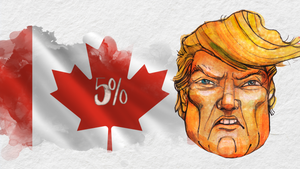A group of Congress members in the US have called on Donald Trump’s White House to put pressure on the Canadian government over the country’s Online Streaming Act and the controversial streaming levy it introduces. With US government pressure having already forced Canada to drop its separate Digital Services Tax, the politicians hope that further pressure could see the streaming levy go the same way.
In a letter to various members of the Trump administration, the Congress members claim that the Online Streaming Act “imposes discriminatory obligations” onto US-based music and video streaming platforms, and also “threatens additional obligations imminently”. This, they say, makes it “a major threat to our cross-border digital trade relationship”.
With wider trade talks between the US and Canada ongoing, they declare, “we urgently request that you engage with your Canadian counterparts to share our concerns and rescind the Online Streaming Act”.
The Online Streaming Act regulates streaming services in a number of ways, but the levy has got the most attention. Streaming services will have to pay 5% of their Canadian revenues into funds that support independent creators and producers in Canada. Money generated by the levy on audio services will be split between music funding initiatives and schemes to support the creation of radio and news content.
The levy has been welcomed by much of the independent music community in Canada, but is opposed by the major record companies and the streaming services, with the latter campaigning against it via their trade body the Digital Media Association.
DiMA boss Graham Davies has again outlined his members’ concerns in response to the letter from the Congress members, insisting that the Online Streaming Act “was problematic” when it was introduced under the Justin Trudeau government, and “is problematic now” as current Canadian Prime Minister Mark Carney navigates a trade war with Trump.
With streaming services likely to pass the levy onto subscribers, “it threatens to increase costs for consumers”, Davies adds, while also “negatively impacting the long-term growth and competitiveness of Canada’s currently flourishing music industry. Canadian artists should not see their future success on the global stage undermined by this needless regulation”.
With that in mind, “We remain committed to working with stakeholders across the music industry, and with the Canadian government, to find a better solution that doesn’t burden listeners, damage the creative economy, or expose Canada to unnecessary trade tensions”.
Donald Trump has made a number of demands of Canada since he returned to the White House earlier this year, using tariffs and trade talks to put pressure on the Canadian government.
A particular target for the Trump administration was Canada’s digital services tax, a 3% tax on revenues generated in Canada by big digital platforms that operate online marketplaces, social media, and/or digital advertising and user data services. The tax went into force last year, but applied to revenue earned from 1 January 2022, with the first payments due by the end of June this year.
Arguing that the tax unfairly targeted US tech giants, Trump suspended trade talks with Canada on 27 Jun in protest at the tax. Two days later the tax was axed and trade talks resumed.
The Congress members now hoping that similar pressure from Trump could kill the streaming levy are all Republicans on the Ways And Means Committee in the House Of Representatives, which has oversight of all things taxes and tariffs. They sent their letter to US Trade Representative Jamieson Greer, Treasury Secretary Scott Bessent and Commerce Secretary Howard Lutnick.
Supporters of the streaming levy in Canada will obviously lobby against any proposals to axe the new funding scheme before it’s even got started, and will hit back at what they see as US politicians interfering in Canadian domestic affairs.
That includes campaign group Friends Of Canadian Media, which told The National Post that the Online Streaming Act “protects Canada’s broadcasting and media sectors and the country’s cultural sovereignty”. It added in a statement, “Our decision-makers here at home have already bent to American pressure once by scrapping the Digital Service Tax. They cannot make such a costly mistake again”.

